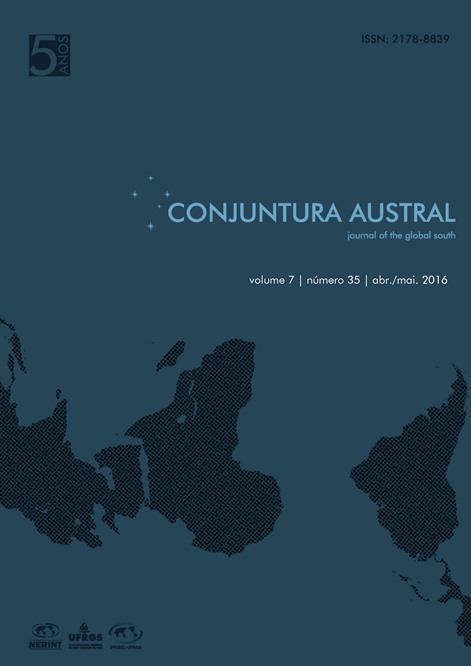Terrorism in South America?: The case of "Alfaro vive carajo"
DOI:
https://doi.org/10.22456/2178-8839.59573Keywords:
Armed Forces, Guerrilla, Insurgency, Wave of the New Left, Revolutionary Force, Urban Insurgency, TerrorismAbstract
Terrorism today is on the agenda worldwide. Its political nature has prevented consensus among the different actors within international organizations, hindering a solution that enjoys global acceptance, hence in the field of security poses a threat to states.
South America was influenced by the Cuban revolution in 1959, with a wave of armed groups appearing in the 60s, which acted according to regional and global trends.
This article links these groups using David Rappoport´s classification of Terrorism and aims to show the existence of two periods within the "third wave" of this classification. A first period of subversion that had more characteristics of rural insurgency, and a second period, known as the urban insurgency, with more features of terrorism.
This work begins with a conceptual analysis of terrorism, followed by a study of the performance of groups framed within the non-governmental terrorism in South America and finally analyzes the performance of the group Alfaro Vive Carajo in Ecuador and the actions taken in their period of existence.
Downloads
Downloads
Published
How to Cite
Issue
Section
License
Authors who publish with this journal agree to the following terms:
a. Authors retain the copyright and grant the journal the right to first publication, with the work simultaneously licensed under the Creative Commons Attribution-Non Commercial-ShareAlike 4.0 International License, which allows its use, distribution and reproduction in any medium, as well as its transformation and creations from it, as long as the original author and source are credited. Also, the material cannot be used for commercial purposes, and if it is transformed, or used as a basis for other creations, these must be distributed under the same license as the original.
b. Authors are able to enter into separate, additional contractual arrangements for the non-exclusive distribution of the journal's published version of the work (e.g., post it to an institutional repository or publish it in a book), with an acknowledgment of its initial publication in this journal.
c. Authors are allowed to deposit, in the repositories accepted by Conjuntura Austral, the preprint version of the manuscripts submitted to the journal prior to and during the submission process, as it can lead to productive exchanges, as well as earlier and greater citation of published work (See The Effect of Open Access)
d. Authors are permitted and encouraged to publish and distribute online (in institutional and /or thematic repositories, on their personal pages, etc.) the postprint version of the manuscripts (accepted and published), without an embargo period.
e. Conjuntura Austral: Journal of the Global South, imbued with the spirit of ensuring the protection of regional academic and scientific production in Open Access, is a signatory to the Mexico Declaration on the use of the Creative Commons BY-NC-SA license to guarantee the protection of academic and scientific production in open access.








